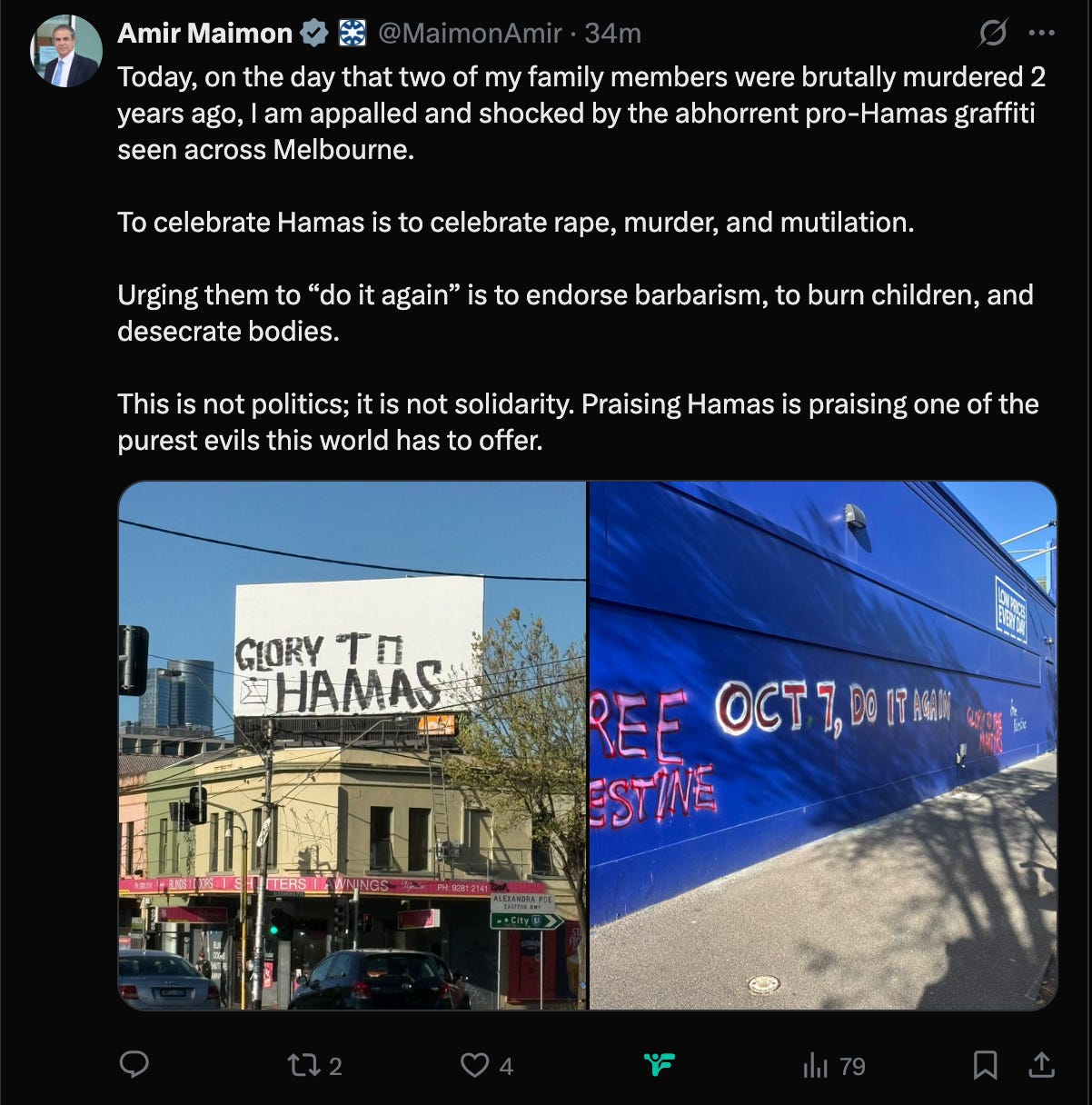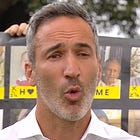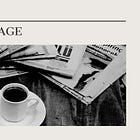Israeli Ambassador Says Jewish Students Need ‘Safe Buildings’ on Australian Campuses as 48 Hostages Remain Captive
This piece is freely available to read. Become a paid subscriber today and help keep Mencari News financially afloat so that we can continue to pay our writers for their insight and expertise.
Today’s Article is brought to you by Empower your podcasting vision with a suite of creative solutions at your fingertips.
Amir Maimon calls security requirements for worship and education “insane,” details freed hostage’s 491-day ordeal as wife and daughters murdered, accuses international community of double standards on genocide claims
Australian Jewish students are the only group requiring dedicated “safe buildings” on university campuses to study in secure conditions, Israeli Ambassador Amir Maimon said in an exclusive Sky News interview, describing the security measures as “insane” two years after the October 7, 2023 Hamas attacks that left 48 hostages still captive in Gaza.
“The Australian students of Jewish faith are the only group of students, Australian students, I’m not talking about Israelis, I’m talking about Australian students. Your students, when they are in the campuses, they have a special building known in many universities as the so-called dedicated building. In other words, safe building, where they can live in a more secure atmosphere,” Maimon told Sky News Newsday ahead of today’s anniversary.
“Kieran, this is insane. This is insane. We’re talking about Australia. We’re talking about your own students. It’s not my students. It’s not my challenge. It’s your challenge,” Maimon said.
The ambassador, who lost family members, friends and students in the attacks, described Israel as remaining “in a state of trauma” as the nation marks two years since Hamas killed 1,200 people and kidnapped 251, including babies, children and elderly.
Truth matters. Quality journalism costs.
Your subscription to Mencari directly funds the investigative reporting our democracy needs. For less than a coffee per week, you enable our journalists to uncover stories that powerful interests would rather keep hidden. There is no corporate influence involved. No compromises. Just honest journalism when we need it most.
Not ready to be paid subscribe, but appreciate the newsletter ? Grab us a beer or snag the exclusive ad spot at the top of next week's newsletter.
Worship Requires Security Barriers
Maimon detailed extraordinary security measures Australian Jews face simply to practice their faith, contrasting their experience with other religious communities.
“There is, if I’m not mistaken, only one community that when its people are looking to exercise, as, you know, we just had yesterday, their inherent right to celebrate their holidays, to worship their God, there is only one community that, in order to enter their worship place, they need to go through security. There are CCTV around, there are security officers around, and there are bars on each window,” Maimon said.
“This is not the way that I believe Australians of Jewish faith or any other faith should experience when they are looking to exercise their inherent rights,” he added.
The comments align with statements from Australian Jewish leaders today describing unprecedented anti-Semitism. Ben Carlill, Australia, Israel and Jewish Affairs Council Director of Special Projects, told Sky News the past two years will take “a generation to heal,” while Independent MP Allegra Spender said constituents “question whether they are still welcome here.”
48 Hostages Still Held
Maimon confirmed 48 hostages remain in Hamas captivity from the original 251 kidnapped on October 7, 2023.
“We are still, as you mentioned, having 48 of our men and women held by the Hamas, the terror organization,” Maimon said, emphasizing the ongoing nature of the crisis.
The ambassador shared details of freed hostage Eli Sharabi’s ordeal to illustrate the brutality hostages endured.
“Ali Sharabi was held by the Hamas for 491 days. And in the beginning, most of the time, he was held in a dark tunnel. He was chained, he was starved, and he was tortured,” Maimon said.
“Only hours after he was released, he learned that his beloved wife and two of his daughters were murdered by the Hamas. Not only that, he also learned about the murdering of his brother, Joseph, whose body is still held by the Hamas,” Maimon added.
Despite the trauma, Sharabi conveyed a message of hope during his recent visit to Australia where he met with Foreign Minister Penny Wong and Deputy Prime Minister Richard Marles.
“Ali is an exceptional individual who I believe represents the essence of who we are as a society. He conveyed here a very clear message that he chose life. We, the Israelis, we choose life. We are not war lovers. We want to live peacefully, in security, in our own country. We want to live,” Maimon said.
Personal Losses and Trauma
Maimon described visiting the homes of victims months after the massacre, experiences that left lasting scars.
“It’s still very sad and difficult for me to talk about it. It’s sad because I lost, like many other Israelis, family members, friends, students, and children of some of my friends,” Maimon said.
He visited Kibbutz Nir Oz in July 2024, months after the attacks.
“I visited the houses of Aviv and also the house of Shiri and Ariel and Kfir Bibas. And you know, it’s one thing to see their posters all over the world, and it’s a totally different thing to visit their home, the home from which they were taken, to see the burned rooms, to see the bloodstains,” Maimon said.
“This is so sad, and I don’t believe that I will ever be able to overcome the scenes and the tragedy that took place on October the 7th,” he added.
Many survivors still cannot return home despite buildings remaining intact.
“There are many that will not return to their homes, not because they were burned, not because they were demolished, the trauma,” Maimon said, noting Sharabi has not returned to his home in Kibbutz Be’eri.
Double Standards Accusation
When asked about International Court of Justice genocide allegations against Israel while hostages remain captive, Maimon accused the international community of applying unique standards.
“I always ask people who criticize Israel actions, what do you think would have been the international community reaction if it wouldn’t have been Israel, if it would have been Sweden, Denmark, Greece, Italy or Portugal that were experiencing the same challenges as we are experiencing?” Maimon said.
“Do you really think that all these countries would have been put under the same pressure as Israel? Believe you me, usually the answer is no. Yes, there is here a double standard. The root cause is not the conflict. The root cause is anti-Semitism,” Maimon said.
Palestine Recognition Criticized
Maimon criticized Australia’s recognition of Palestine alongside Britain and Canada, arguing it undermined peace negotiations rather than advancing them.
“It didn’t help. And it didn’t help the American administration and the other parties that are involved in the ongoing efforts to bring about an end to the war in Gaza, to bring the Hamas to accept the terms as they were tabled just a few days ago by President Trump,” Maimon said.
He argued recognition sends the wrong message to Hamas negotiators.
“The Hamas will understand that they can get more outside the negotiating table than inside the negotiating table, so why should at all they resume negotiation?” Maimon said.
The ambassador dismissed the notion that declarations alone achieve statehood or practical outcomes.
“It will not change anything on the ground. Declaration will not create a Palestinian state. A declaration will not bring about the release of our hostages,” Maimon said.
He compared statehood to democracy, arguing both require institutional foundations rather than mere declarations.
“Election or election is not all about—it’s not just about—it’s not democracy. In order to live in democracy, you need to build democratic institution. You need to change the curriculum. You need to educate people to live in peace with their neighbours,” Maimon said.
Australia’s Justification
When told the Australian government believes recognition increases pressure on Israel not to abandon a two-state solution, Maimon questioned the logic.
“I don’t see how, by unilaterally recognizing a Palestinian state, how it will bring the Israeli government to adhere to the past agreements and to participate in negotiation that will lead to a peaceful outcome,” Maimon said.
He emphasized that President Trump and others have stated “the only way forward is if the two parties, the Israelis and the Palestinians, will find a way to negotiate the remaining major hurdles and major and outstanding issues.”
“It is for the two parties that are involved to determine how the future will be seen,” Maimon added.
Protest Rights Balance
Asked about balancing freedom of protest against Jewish community safety concerns, particularly regarding planned Opera House demonstrations near the October 7 anniversary, Maimon articulated a principle of reciprocal rights.
“I believe in a very simple principle. When you grant one party to exercise its inherent right to protest, to demonstrate, you should make sure that you’re not denying other party rights to exercise their inherent rights,” Maimon said.
He tied the protest question directly to the security measures Jewish Australians face in worship and education.
Social Cohesion Concerns
When asked about potential social cohesion issues if Australia accepts Gaza refugees who may have been indoctrinated with anti-Jewish hatred by Hamas, Maimon redirected responsibility to Australian values.
“It is first and foremost Australia’s concern. And as I said before, when it comes to social cohesion-related issues, I reject the suggestions that what you are experiencing here is related to the war in Gaza,” Maimon said.
“It is first and foremost related to the set of values that you expect Australians to follow once they chose Australia as their homeland. It’s one thing to preserve your cultural roots, to enjoy the wonderful cuisine of different ethnical groups, but it is very important to follow the same set of values,” Maimon added.
Waiting for Hamas Response
Israel has accepted President Donald Trump’s peace proposal and awaits Hamas’s response, Maimon emphasized.
“Prime Minister Netanyahu, the government of Israel accepted the proposal that was tabled by President Trump. So we are all waiting for the Hamas, a terror organization, a terror organization that is listed also and recognized also here in Australia, respond,” Maimon said.
He distinguished between Israeli objectives and Palestinian civilians.
“It’s very important also to emphasize that our war against Hamas is not a war against the Palestinian people. It’s very important to understand. The Hamas is the source of the suffering in our part of the world, for both the Israelis and the Palestinians. And this is something that not always is well understood,” Maimon said.
Israel’s objectives remain consistent since October 7: “the dismantling of the Hamas military and political capabilities, and, of course, to bring about the release of our hostages.”
“The elimination of the Hamas military capabilities is also part of the recent peace proposal that was taken by the Trump administration,” Maimon noted.
Foreign Minister Relations
Addressing questions about whether Australia has placed him in a “diplomatic deep freeze,” Maimon denied isolation while acknowledging changed relationship dynamics.
“I’m not isolated, and we have a very good exchange, communication with the senior government official. And the foreign minister,” Maimon said.
“We meet regularly. We speak over the phone, and not just after October the 7th, but even before our first meeting took place when she was in the opposition. And this is something that I really value and appreciate,” Maimon said of Foreign Minister Penny Wong.
However, he acknowledged bilateral strain: “At the same time, I can’t say that the current status of our bilateral relationship is as it was, let’s say, in the beginning of 2022.”
Generational Military Service
Maimon shared his family’s military history spanning generations, expressing hope his three-year-old grandson Adar will not face the same fate.
“I was born to a family where the father was always in the battlefield. My late father, he fought in the War of Independence. He lost his brother and two of his first cousins in the War of Independence. And I never knew my father until I reached a teenager, teenage. And when he came back home, it was my turn to join the army,” Maimon said.
“I was really hoping and wishing that my children, my boys, would not have to experience what he had experienced, what I had experienced. And unfortunately, two of my boys completed the military service in combat units,” Maimon said.
“Now I have a three-year-old Adar grandchild, and I can only in prayer that he will not have to experience. And when I’m praying for him and wishing for him, I’m also wishing for Palestinian children, that they will not have to experience the same thing,” Maimon added.
Optimism Despite Trauma
Despite the ongoing crisis and generational military service, Maimon described himself as “by nature very optimistic.”
When asked if he envisions his grandchildren enjoying peace, he extended the hope beyond Israeli children.
“When I’m praying for him and wishing for him, I’m also wishing for Palestinian children, that they will not have to experience the same thing,” Maimon said.
The ambassador characterized October 7’s second anniversary as representing both personal and national grief.
“A very sad day. It’s not just personal grief, it’s national grief. We are still in a state of trauma,” Maimon said.
He emphasized the importance of understanding the human dimension beyond statistics.
“While people are talking about numbers, and quite often you hear people referring to the number 1,200 Israelis that were massacred, that was butchered, murdered and burned. And right afterwards, they do also mention that this is the highest number of murdered Jews since the Holocaust. But behind every number, there is a name. There is a story. It’s a whole world,” Maimon said.
The interview was conducted late last week to accommodate the Jewish holy day of Sukkot, during which work is prohibited, allowing the ambassador to reflect on the anniversary without violating religious observances.
Maimon’s descriptions of Jewish Australians requiring security barriers to worship and students needing dedicated safe buildings on campuses provide concrete domestic examples of the anti-Semitism surge multiple community leaders referenced today, adding Australian dimensions to the international crisis that began with the October 7 attacks two years ago.
Sustaining Mencari Requires Your Support
Independent journalism costs money. Help us continue delivering in-depth investigations and unfiltered commentary on the world's real stories. Your financial contribution enables thorough investigative work and thoughtful analysis, all supported by a dedicated community committed to accuracy and transparency.
Subscribe today to unlock our full archive of investigative reporting and fearless analysis. Subscribing to independent media outlets represents more than just information consumption—it embodies a commitment to factual reporting.
As well as knowing you’re keeping Mencari (Australia) alive, you’ll also get:
Get breaking news AS IT HAPPENS - Gain instant access to our real-time coverage and analysis when major stories break, keeping you ahead of the curve
Unlock our COMPLETE content library - Enjoy unlimited access to every newsletter, podcast episode, and exclusive archive—all seamlessly available in your favorite podcast apps.
Join the conversation that matters - Be part of our vibrant community with full commenting privileges on all content, directly supporting The Evening Post (Australia)
Catch up on some of Mencari’s recent stories:
It only takes a minute to help us investigate fearlessly and expose lies and wrongdoing to hold power accountable. Thanks!









